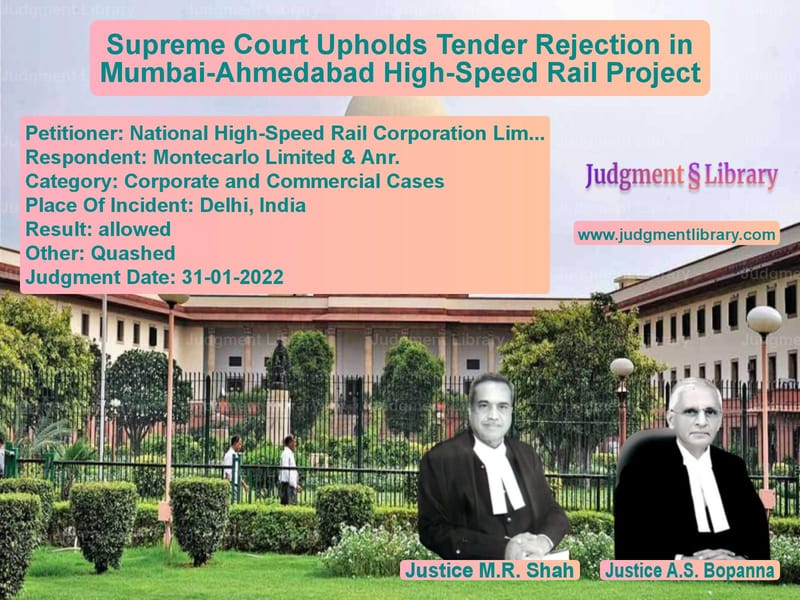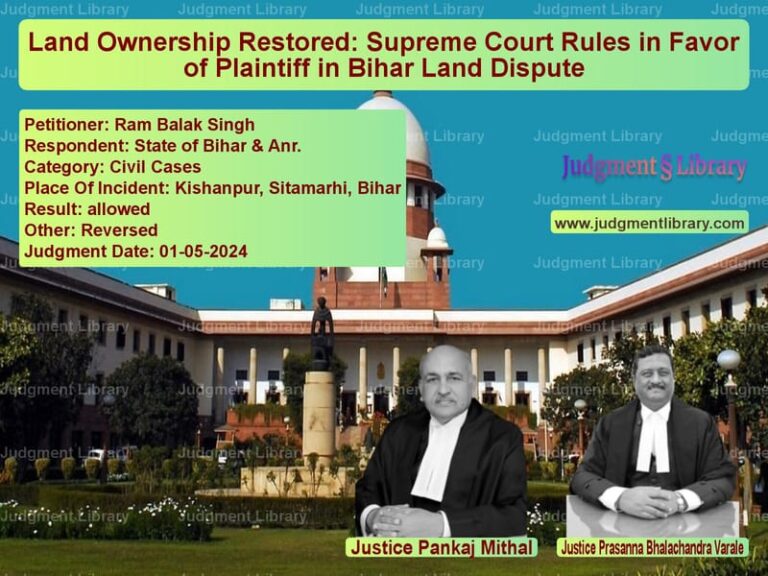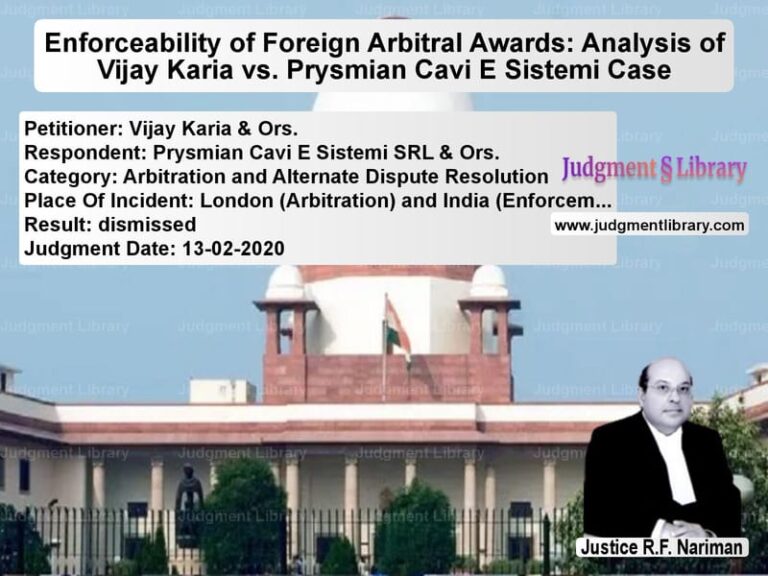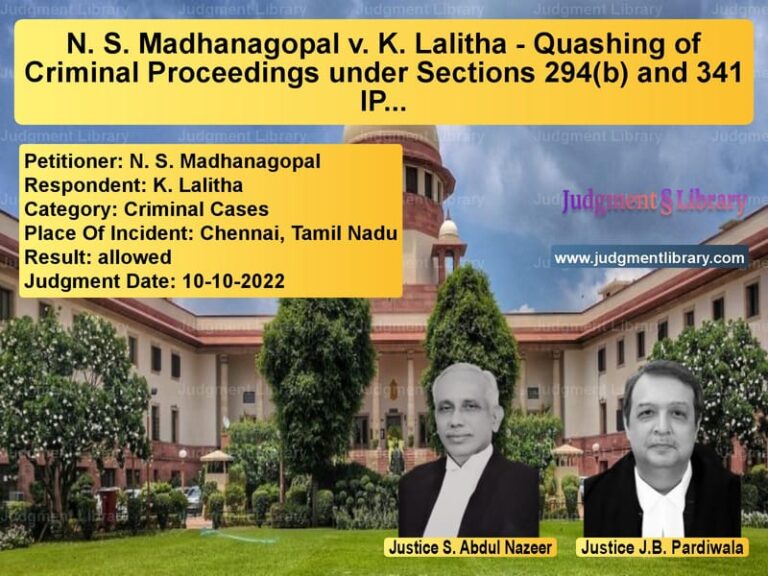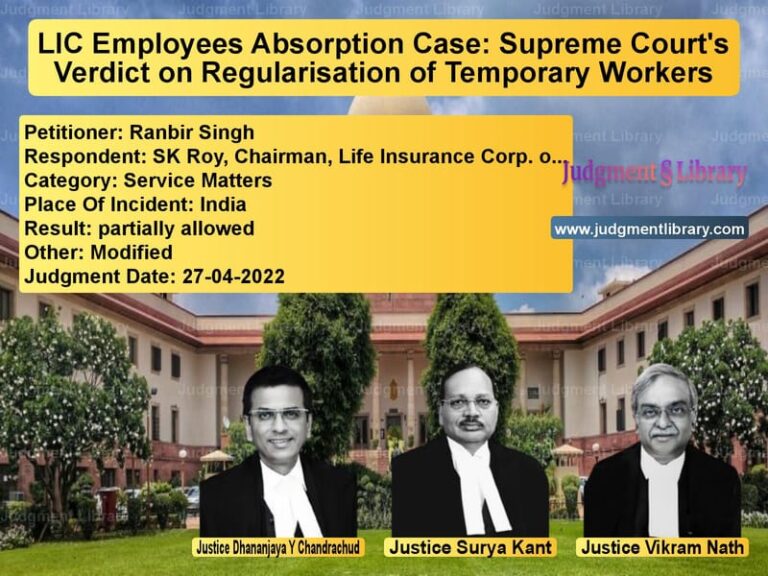Supreme Court Upholds Tender Rejection in Mumbai-Ahmedabad High-Speed Rail Project
The Supreme Court of India’s ruling in National High-Speed Rail Corporation Limited (NHSRCL) vs. Montecarlo Limited & Anr. is a landmark judgment in the field of government tenders and foreign-funded infrastructure projects. The Court upheld the rejection of Montecarlo Limited’s bid for a key contract in the Mumbai-Ahmedabad Bullet Train Project, reinforcing the principle that judicial review in tender matters should be minimal, particularly when the bidding process is governed by international funding agencies. The verdict has significant implications for large-scale infrastructure projects and establishes guidelines for bid evaluation procedures.
Background of the Case
The Mumbai-Ahmedabad High-Speed Rail (MAHSR) Project is India’s first bullet train initiative, funded by the Japan International Cooperation Agency (JICA) under a special loan agreement between India and Japan. As part of the project, National High-Speed Rail Corporation Limited (NHSRCL) issued a tender for constructing a maintenance depot, with bid evaluation conducted by Japan International Consultants Consortium (JICC), a JICA-appointed agency.
Montecarlo Limited, an Indian infrastructure firm, submitted a bid for the tender but was disqualified during the technical evaluation stage. The NHSRCL, acting on JICC’s recommendation, rejected Montecarlo’s bid due to non-compliance with specific bid document conditions. Montecarlo challenged this rejection before the Delhi High Court, which ruled in its favor and directed NHSRCL to reconsider its bid. NHSRCL then approached the Supreme Court to appeal this ruling.
Legal Issues Raised
- Whether NHSRCL’s rejection of Montecarlo’s bid was arbitrary and violated the principles of fair play in tendering.
- Whether courts have the authority to interfere in bid evaluation processes of foreign-funded infrastructure projects.
- Whether Montecarlo’s bid rejection was justified under the terms of the JICA agreement.
- Whether NHSRCL’s actions amounted to discrimination among bidders.
Petitioner’s (NHSRCL) Arguments
NHSRCL, represented by its legal counsel, argued the following:
- The bid evaluation process was conducted by JICC, the agency appointed by JICA, which had final authority in the matter.
- Montecarlo’s bid had material deviations, including the failure to sign crucial forms required under the bidding documents.
- The rejection of Montecarlo’s bid was consistent with the tender guidelines, which mandated strict compliance.
- The Delhi High Court overstepped its jurisdiction by interfering in an international procurement process governed by a bilateral agreement.
- Judicial interference in government tenders should be limited to cases involving mala fides or manifest arbitrariness, neither of which was present here.
Respondent’s (Montecarlo Limited) Arguments
Montecarlo Limited challenged its disqualification, stating:
- Other bidders were given the opportunity to correct similar errors, while Montecarlo was denied such a chance.
- The deviations in Montecarlo’s bid were minor and should have been overlooked under the principle of substantial compliance.
- The rejection of its bid was arbitrary and inconsistent with previous NHSRCL decisions.
- The Delhi High Court correctly ruled in favor of Montecarlo, ensuring a fair and competitive bidding process.
Supreme Court’s Observations
The Supreme Court, comprising Justices M.R. Shah and A.S. Bopanna, made several key observations:
1. Judicial Review in Government Tenders
- The Court reaffirmed that judicial review in contractual matters, especially in government tenders, is limited.
- It stated that courts should not interfere in tender decisions unless there is clear evidence of mala fides, bias, or gross arbitrariness.
- The Court cited Tata Cellular v. Union of India (1994), which established that judicial interference in tender matters should be minimal.
2. Foreign-Funded Projects and JICA’s Role
- The Court noted that JICA had significant control over the tender process, as per the loan agreement between India and Japan.
- JICC’s bid evaluation decisions were binding, and NHSRCL had no discretion to override them.
- Judicial intervention in such cases could potentially disrupt international funding arrangements.
3. Doctrine of Substantial Compliance
- The Supreme Court held that the principle of substantial compliance does not apply to tenders governed by international funding agencies.
- It emphasized that strict compliance with bid document conditions is essential in high-value infrastructure contracts.
- The Court ruled that NHSRCL was justified in rejecting Montecarlo’s bid for material deviations.
4. Delhi High Court’s Overreach
- The Supreme Court criticized the Delhi High Court for interfering in a purely contractual matter involving foreign funding.
- The High Court failed to recognize that NHSRCL was bound by JICC’s decision and had no authority to reconsider Montecarlo’s bid.
- Allowing judicial interference in such cases would set a dangerous precedent for infrastructure projects.
Final Judgment
The Supreme Court ruled in favor of NHSRCL and set aside the Delhi High Court’s order. The judgment stated:
“The appeal is allowed. The impugned judgment of the Delhi High Court dated 31.01.2022 is set aside. NHSRCL’s rejection of Montecarlo Limited’s bid stands upheld. There shall be no further interference in the bidding process of the Mumbai-Ahmedabad High-Speed Rail Project.”
Implications of the Judgment
- Strengthening the Integrity of Government Tenders: The ruling affirms that tender authorities have the discretion to enforce bid compliance strictly.
- Limited Judicial Review in International Contracts: The judgment sets a precedent that courts should not interfere in foreign-funded projects unless there is clear illegality.
- Ensuring Fairness in Bid Evaluation: The decision highlights the importance of treating all bidders equally while maintaining the integrity of procurement processes.
- Impact on Future Infrastructure Projects: The ruling provides clarity for foreign investors and funding agencies, ensuring that their guidelines will be upheld.
Conclusion
The Supreme Court’s decision in National High-Speed Rail Corporation Limited vs. Montecarlo Limited reinforces the principle that bid evaluation decisions must be respected, especially in foreign-funded projects. By overturning the Delhi High Court’s ruling, the Court upheld the necessity of strict compliance with tender conditions and limited judicial intervention in procurement matters. This ruling is a significant precedent for government contracts and international collaborations in India’s infrastructure sector.
Petitioner Name: National High-Speed Rail Corporation Limited.Respondent Name: Montecarlo Limited & Anr..Judgment By: Justice M.R. Shah, Justice A.S. Bopanna.Place Of Incident: Delhi, India.Judgment Date: 31-01-2022.
Don’t miss out on the full details! Download the complete judgment in PDF format below and gain valuable insights instantly!
Download Judgment: national-high-speed-vs-montecarlo-limited-&-supreme-court-of-india-judgment-dated-31-01-2022.pdf
Directly Download Judgment: Directly download this Judgment
See all petitions in Company Law
See all petitions in Corporate Compliance
See all petitions in unfair trade practices
See all petitions in Mergers and Acquisitions
See all petitions in Bankruptcy and Insolvency
See all petitions in Judgment by Mukeshkumar Rasikbhai Shah
See all petitions in Judgment by A. S. Bopanna
See all petitions in allowed
See all petitions in Quashed
See all petitions in supreme court of India judgments January 2022
See all petitions in 2022 judgments
See all posts in Corporate and Commercial Cases Category
See all allowed petitions in Corporate and Commercial Cases Category
See all Dismissed petitions in Corporate and Commercial Cases Category
See all partially allowed petitions in Corporate and Commercial Cases Category

